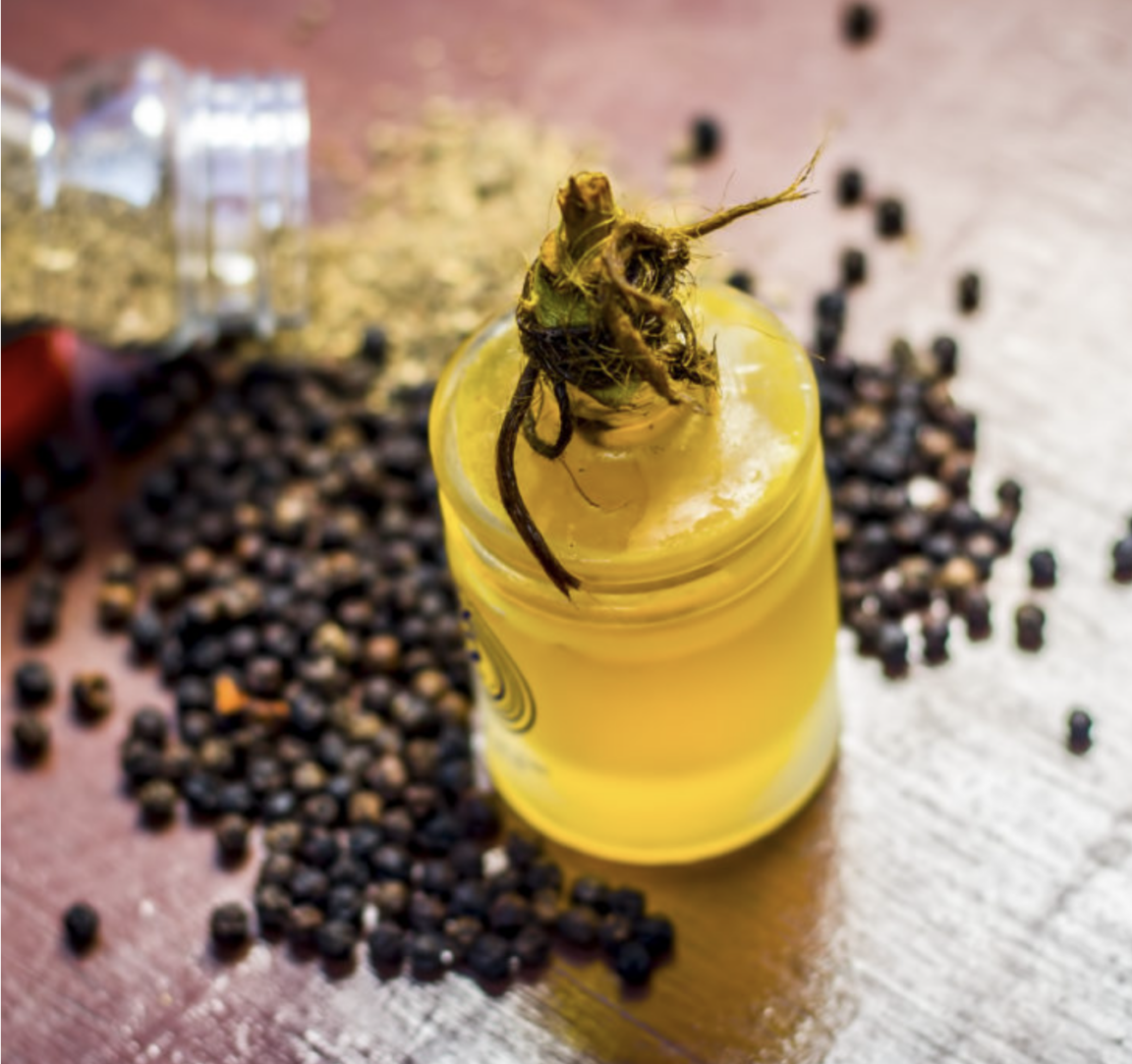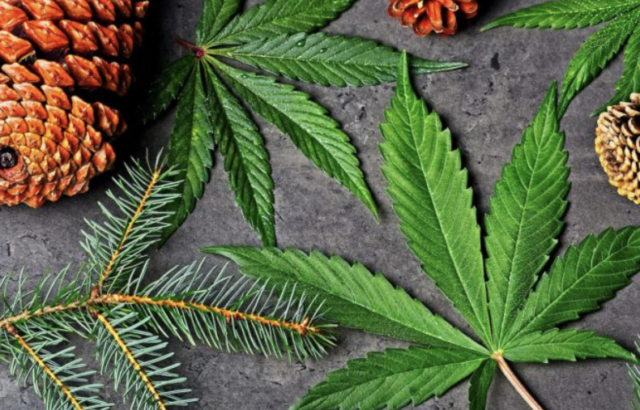If you keep hearing about beta-caryophyllene terpenes and want to know what it is, you’ve come to the right place. Beta-caryophyllene (also known as β-caryophyllene or BCP for short) is one of the more common marijuana terpenes. It’s also one of the most impactful and most-researched marijuana terpenes. Here are some of the highlights from current research into β-caryophyllene and some strains with high levels of BCP terpenes.
About the Beta-Caryophyllene Terpene
BCP is a spicy terpene that naturally occurs in various plants, including basil, black pepper, cinnamon, cloves, hops, rosemary, and cannabis. In part, BCP is officially an FDA-approved food additive because beta-caryophyllene terpenes are found in so many edible plants and herbs. Interestingly, more than 500 scientific publications have investigated the protective role of beta-caryophyllene against nervous system-related disorders.
The scientific and medical communities have been interested in β-caryophyllene as a neuroprotectant, immune system modulator, and antioxidant. Some medical marijuana patients are interested in strains with lots of beta-caryophyllene terpenes for the same reasons. Other MMJ patients in Pennsylvania ask about BCP because they’re interested in the different ways it makes them feel.
Understanding Beta-Caryophyllene Effects
This peppery terpene is commonly associated with feelings of relief, relaxation, and an elevated mood. Animal-based studies have found BCP to relieve discomfort from inflammation as well as neuropathic pain. This makes it a desirable terpene among people who become medical marijuana patients to address physical discomfort. Similarly, medical marijuana patients often report that strains with high levels of beta-caryophyllene terpenes tend to produce sensations of euphoria and reduced stress.
Additional animal-based studies have found that the subjects did not build a tolerance to BCP. In other words, the effects of β-caryophyllene do not diminish over time. Medical marijuana patients might be happy to know that, unlike THC, beta-caryophyllene terpenes do not produce intoxicating effects. This presents an option to choose a strain with the desired terpenes instead of always going for more THC.
If all this talk about research projects is more than you wanted to know, how about some advice from musician Neil Young? In an interview with Howard Stern, he claimed that chewing a few black pepper balls helps him out when he gets uncomfortably high or paranoid.
This might sound like a joke, but the Chicago Tribune reports that the idea is scientifically sound. The trick works, they say, because of the terpenes in black peppercorn. Black peppercorn contains high levels of alpha-pinene and – you guessed it – beta-caryophyllene terpenes.
Beta-Caryophyllene Triggers “Bliss Molecule” Production
One thing that makes β-caryophyllene so unique is the way it binds to CB2 receptors in your body’s endocannabinoid system (ECS). The German scientists who studied BCP’s influence on CB2 receptors suggest that this unique chemical action is responsible for the terpene’s exaggerated effects compared to other terpenes.
Specifically, beta-caryophyllene terpenes encourage CB2 receptors to increase the production of anandamide. Anandamide is a type of cannabinoid your body’s ECS produces naturally and has been associated with pain and mood regulation.
Unlike CB1 receptors, concentrated in the central nervous system, CB2 receptors primarily exist in the peripheral nervous system and immune cells. The ability of β-caryophyllene to bind to CB2 receptors makes this terpene interesting to scientists who study immune system regulation.
Terpenes and the Entourage Effect
Each cannabis plant contains multiple terpenes, which helps to consider the entire terpene profile when choosing a strain. For example, pinene is also associated with physical relaxation, so combining it with β-caryophyllene can make the effects of each more noticeable. The same could be said for finding a strain that combines BCP with myrcene when you want calming effects.
Every cannabis strain brings an entire entourage of terpenes, and it’s worth considering the whole entourage, even if you’re primarily interested in beta-caryophyllene. If you choose a strain with some BCP but much more of the limonene terpene, the limonene might win out to create a more energizing experience. To experience the purest expression of the effects of β-caryophyllene, you want a strain with exceptionally high levels of it and similar terpenes.
Explore High Beta-Caryophyllene Strains at FLUENT
To serve medical marijuana patients with diverse requirements, cannabis cultivators constantly create new strains with unique terpene profiles. As you learn more about what you want from your experience and which terpenes are most relevant to you, it gets easier to hone in on your favorite strain. For anyone who wants to explore the potential of β-caryophyllene, any of these three strains would be a great place to start.
1 – Gelato 41
Gelato 41 is a balanced hybrid with a good deal of BCP. In this case, the β-caryophyllene is paired with two other major terpenes:
- Limonene – Commonly associated with a head high, including elevated mood and increased energy
- Linalool – Also found in lavender, believed to usher in feelings of deep relaxation and contentment
Linalool is an excellent complement to beta-caryophyllene because it shares many of the same qualities. The touch of limonene brings this strain back into balance and makes it more appealing to medical marijuana patients who don’t want to get too relaxed just yet.
2 – MAC #1
Like Gelato 41 x Bwizz, MAC #1 contains limonene as one of the major terpenes. FTH 91 Animals, however, adds myrcene into the mix. Myrcene is an earthy, musky terpene also found in mangos, thyme, lemongrass, and thyme. It’s commonly associated with pleasant feelings of drowsiness. Again, the limonene does provide some balance, but this strain is considered very calming because of the combination of myrcene and BCP.
3 – Biscotti
Yet another option from the legendary growers at INSA, Biscotti, is one of the best beta-caryophyllene strains in Pennsylvania. BCP is the second-top terpene in this strain, so the beta-caryophyllene effects are fully displayed. Other major terpenes, including limonene, humulene, and myrcene, help round out the entourage. The characteristics of limonene and myrcene are discussed above, but humulene is a new addition to this list.
Beyond cannabis, humulene is prevalent in pine trees, sunflowers, black pepper, mint, and hops. The earthy, herbal terpene was first discovered in hops, and it’s a big part of what you’re a lot of hoppy brews like IPAs.
Shop Beta-Caryophyllene Strains Today!
Any of the three strains above will make an excellent place to start your search for strains with β-caryophyllene. Your search doesn’t have to end there, though! Because it’s one of the most common cannabis terpenes, β-caryophyllene is in all kinds of strains. When you visit a medical marijuana dispensary in Pennsylvania, you will find BCP terpenes in many different strains, each with its unique entourage.
We understand that too many choices sometimes make it hard to pick your next strain. Luckily, the patient care staff at FLUENT has excellent knowledge of the terpene profiles in the strains we carry. Our team is ready to help you find all the terpenes and cannabinoids you’ve been searching for, so pick your nearest medical marijuana dispensary and visit us today!



